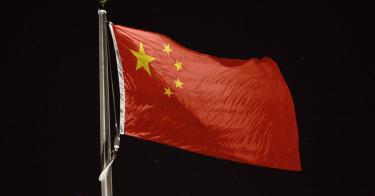China has been flexing its naval muscles around Taiwan. In April, a Chinese aircraft carrier battle group conducted a six-day training drill off the coast of Zhejiang Province in the East China Sea and near Taiwan. In July, Beijing announced it would hold another military drill off Zhejiang for two weeks in July and early August, with all ships from other countries barred from entering the designated training zone.
Some analysts have linked the July announcement to two brief stopovers of U.S. military aircraft at Taipei’s Songshan Airport: the first, a June 6 visit by three U.S. senators aboard a C-17 military transport plane delivering 750,000 donated vaccine doses; the second, a half-hour stopover by an Air Force cargo plane on July 15.
It’s doubtful that these landings alone could have sparked Beijing’s latest naval fireworks. The fuse was much more likely lit July 13 in Tokyo. On that date, Japan removed Taiwan from a map of China in its “Defense of Japan” white paper focusing on China‘s threats to the South China Sea and Pacific region. The removal followed several official statements from Tokyo in support of Taiwan’s defense.
China’s increasing aggressiveness has led Japan to urge the U.S. and its European allies to pay more heed to the Indo-Pacific region. Japanese leadership has often expressed deep concern over China‘s belligerence over Taiwan, its control of resources in the South China Sea, its assertation of ownership rights over Japanese islands, and its sending ships into the Exclusive Economic Zones of other countries. On several occasions, the Japanese Defense and Foreign Ministers have complained that China‘s actions threaten regional peace and may force Japan and the U.S. to intervene militarily if China attacks Taiwan.
As expected, China responded with anger. Chinese Foreign Ministry spokesman Zhao Lijian complained that Japan had “grossly interfered in China‘s internal affairs, groundlessly blamed China‘s normal defense construction and military activity, pointed fingers at China‘s maritime activity, and hyped up the so-called China threat, which is wrong and irresponsible.”
A far stronger response from a Chinese Communist Party (CCP) committee in northeastern China threatened “nuclear bombs” against Japan if it attempts to interfere with a Chinese invasion of Taiwan. In its 5-minute video, the narrator calls for nuclear attacks against Japan if it attempts to defend Taiwan from a Chinese attack and also proposes a “Japan Exception Theory.” If Japan dares to intervene with force when China “liberates” Taiwan, the narrator states, the Communist country will respond with an all-out war against Japan, striking first with nuclear bombs and will continue to use them until Japan surrenders unconditionally for the second time.
Boasting about 60 years of nuclear arms development, the narration goes on to state that “we solemnly put forward the ‘Japan Exception Theory,’” apparently suggesting that Japan become the exception to the “no first use” (NFU) nuclear warfare policy that China declared in 1964. This is followed by accounts of atrocities committed by Japanese soldiers against the Chinese during the two Sino-Japanese wars and a warning that if a third such war breaks out, the Chinese people will take revenge for both old and new scores.
Since Japan is the only country in the world to have suffered a nuclear attack, the video continues, unleashing nuclear weapons upon Japan will yield twice the result with half the effort. The original video was deleted after rapidly attracting over 2 million views.
In a second video, the narrator stresses the numerical superiority and fighting will of the PLA compared to Japanese forces and claims that, after Japan is defeated, China will break up its four main islands into independent countries under the supervision of China and Russia, which will both establish military garrisons there. Okinawa would be broken off from Japan and either be managed by China or become an independent country. The video concludes with a vow to punish Japan Prime Minister Yoshihide Suga, former Prime Minister Abe Shinzo, and Deputy Prime Minister Aso Taro.
U.S. Defense Secretary Lloyd Austin recently stated the United States would continue to help Taiwan and other allies in the Pacific defend themselves against aggression from China. “We will not flinch when our interests are threatened,” Austin said at the International Institute for Strategic Studies in Singapore in July.
When discussing China, pundits are fond of saying, “China doesn’t want war.” That may be the case, but the increasingly belligerent rhetoric coming from China is something we have not seen in centuries. We should be prepared to revisit everything we believe about China.
This piece originally appeared in The Washington Times.



